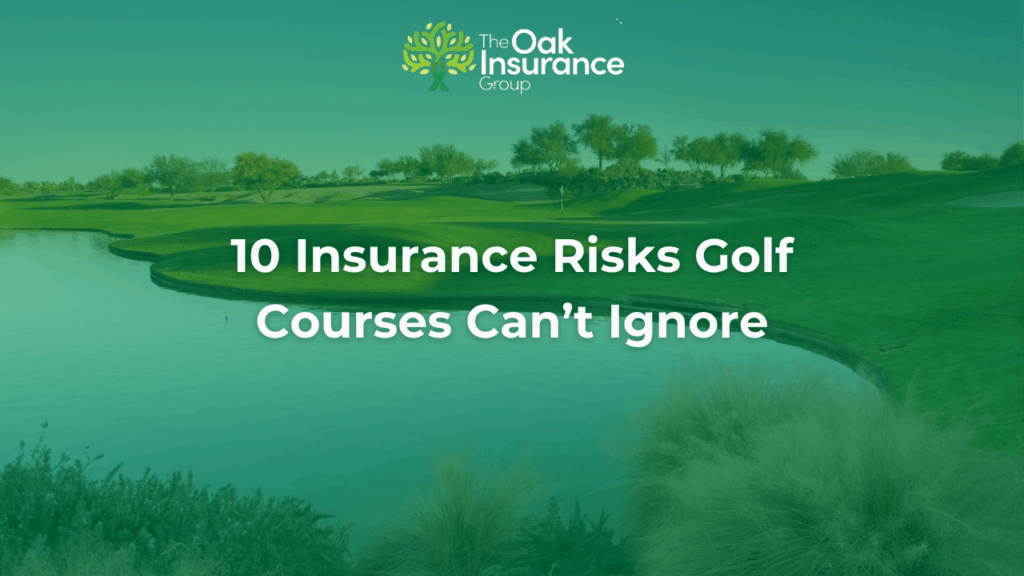
Do you know if your golf course insurance would actually cover you in a disaster?
Have you considered that your coverage might not reflect the multi-million dollar risks your property faces every day?
In Georgia—where municipal law adds legal complexity and the state’s golf industry is booming—insurance gaps aren’t just a possibility, they’re a probability. From outdated property valuations to hidden liability exposures, the cost of being underinsured can be financially devastating.
This article walks you through a 10-point checklist to help Georgia golf course operators identify underinsurance risks and close critical coverage gaps.
You’ll learn how to evaluate replacement costs, ensure liability protection, understand unique municipal exposures, and more—all through a lens tailored to Georgia’s legal and environmental landscape.
1. Are You Insuring Your Property for Its Full Replacement Cost?
Most golf courses are dramatically undervalued in their policies. Outdated assessments often ignore rising construction costs, significant renovations, or the full value of high-end facilities like clubhouses. According to a 2024 study by General Re, golf courses are increasingly vulnerable to fire and natural disasters—making accurate valuation essential.
Action Point: Get a professional appraisal for every structure—clubhouses, maintenance buildings, shelters—and insure them at full Replacement Cost Value (RCV), not depreciated Actual Cash Value (ACV).
2. Is Your $1 Million+ Equipment Fleet Properly Insured?
A single mower can cost $70,000—and most policies don’t fully cover your equipment. Golf course machinery often ends up in underfunded “contents” buckets. Considering these assets require regular replacement and frequent use, inadequate coverage is a major blind spot.
Action Point: Inventory your fleet and insure each item for full replacement value. Consider equipment floaters or inland marine policies for broader protection.
3. Could Your Business Survive a Catastrophic Interruption?
If a storm shut you down for six months, would your insurance truly cover your lost revenue? Many policies overlook revenue from food, merchandise, memberships, and tournaments—especially for municipal courses prioritizing access over profit.
Action Point: Consult a forensic accountant to align your business interruption policy with actual total revenue. Make sure the coverage period includes time for rebuilding and re-engaging customers.
4. Are Your Liability Limits Built for Today’s Legal Landscape?
Jury awards are skyrocketing—your $1 million general liability policy might not cut it. Recent verdicts in the golf industry range from hundreds of thousands to multi-million-dollar settlements.
Action Point: Secure a commercial umbrella or excess liability policy of $5–$10 million or more to shield your business from catastrophic legal costs.
5. Do You Understand the Georgia Sovereign Immunity Trap?
If you operate a municipal course, buying insurance could waive your legal immunity. Under O.C.G.A. § 36-33-1, municipal entities in Georgia lose their sovereign immunity protection up to their policy limits the moment they purchase liability insurance.
Action Point: Consult legal and insurance experts who specialize in Georgia public sector risk. Structure your insurance program to protect against lawsuits without unintentionally creating exposure.
6. Are You Covered for Environmental and Pollution Risks?
One chemical spill could cost more than your annual profits. Fuel leaks, fertilizer runoff, and pesticide drift are not covered by standard liability policies—and federal oversight is intensifying.
Action Point: Purchase a standalone Environmental Impairment Liability (EIL) or Pollution Liability policy to cover environmental cleanup and legal defense costs.
7. Is Your Fire Protection Plan Lithium-Ion Ready?
Electric carts and battery-powered equipment pose serious fire hazards. A 2024 study found that lithium-ion battery fires are a leading cause of destructive blazes at golf courses—and they can’t be extinguished with water alone.
Action Point: Store and charge batteries in fire-resistant areas or specialized cabinets. Ban charging in locker rooms. Review protocols with your insurer and fire department.
8. Is Your Workers’ Compensation Program Sufficient?
Tractor rollovers, mower accidents, and heat stroke are common risks. Frequent injuries drive up premiums and hurt morale.
Action Point: Enforce a strict safety program. Review classifications and limits on your workers’ comp policy to ensure adequate coverage and cost control.
9. Are You Prepared for a Cyber Attack?
Hackers don’t care that you’re a golf course. If you process payments, book online tee times, or store customer data, you’re at risk.
Action Point: Invest in cyber liability insurance. This won’t be covered under general liability. Secure your systems and train staff on cybersecurity best practices.
10. Have You Reviewed Specialized Coverages?
Generic coverage isn’t enough. If you serve alcohol, host tournaments, or have a board of directors, you have unique exposures that standard policies overlook.
Action Point: Consider policies for:
- Liquor Liability – Required if alcohol is served.
- Prize Indemnity – Covers big prize contests like hole-in-ones.
- Directors & Officers (D&O) – Protects decision-makers.
- Employment Practices Liability (EPLI) – Covers HR-related claims.
From Exposure to Protection: Your Next Move
At the end of the day, managing a Georgia golf course comes with more insurance complexity than most operators realize. This is especially true when you factor in public vs. private ownership, environmental concerns, and the rising cost of litigation.
Now that you’ve identified potential underinsurance risks, your next step is to consult with an insurance professional who understands the unique demands of the golf industry in Georgia. They can help you close coverage gaps, reduce legal exposure, and build long-term resilience.
Don’t wait for a claim to reveal your vulnerabilities—take action today to ensure your course is truly covered.

